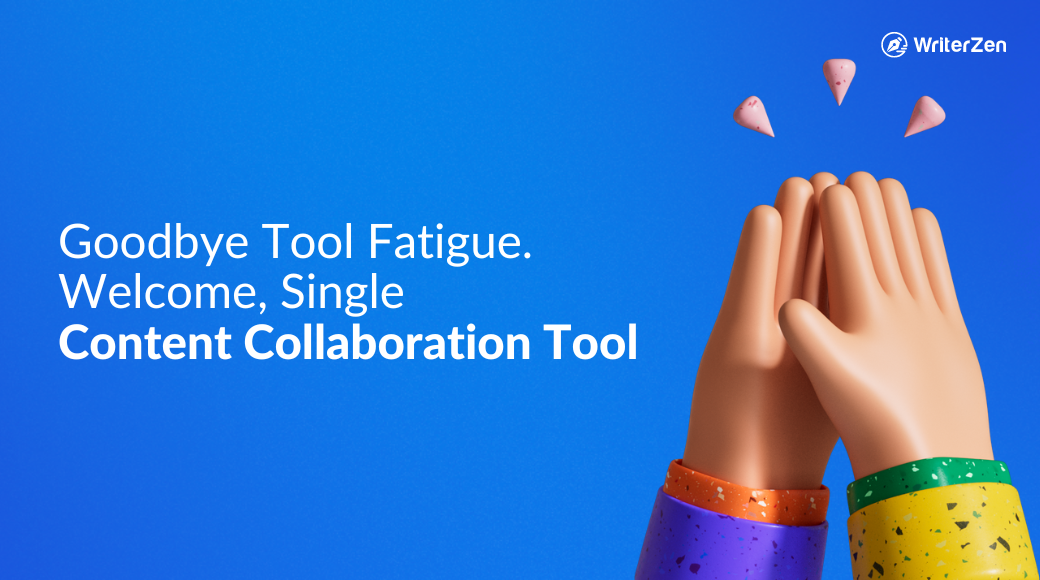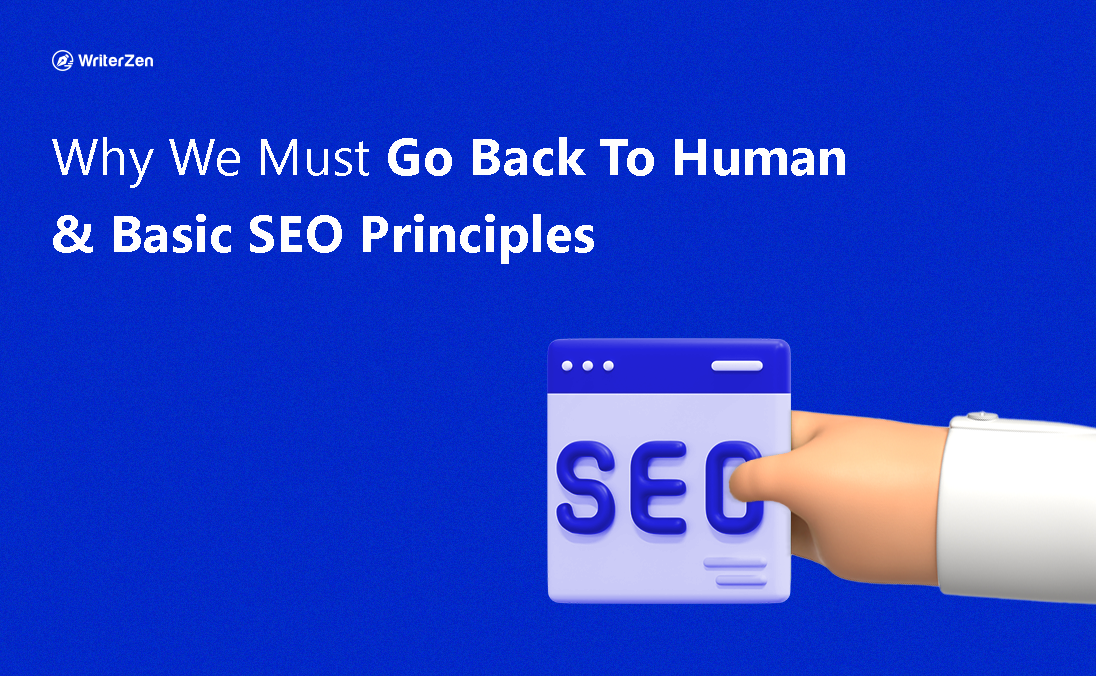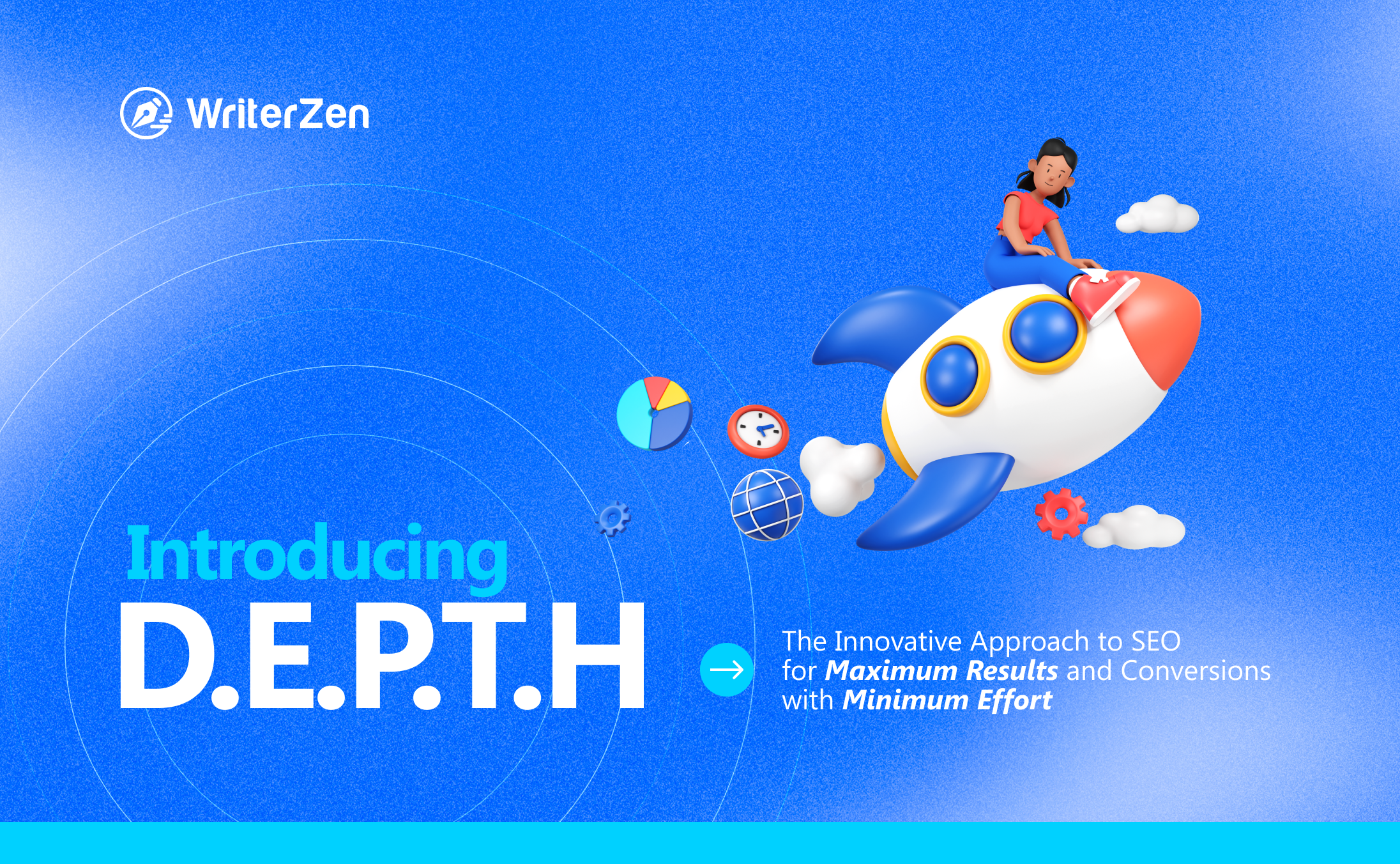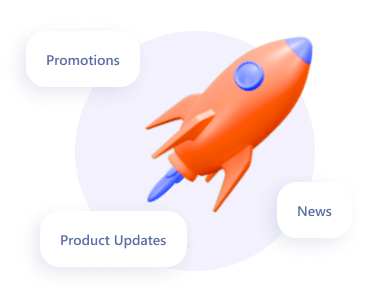As we delve into the realm of SEO, it's evident that the fusion of automation with strategic initiatives can redefine success metrics. Automated workflows don't merely alleviate the manual burden but reposition SEO endeavors to be smarter, more data-driven, and vastly scalable.
It’s important to thoroughly understand how automation in SEO can streamline our workflow, reduce redundant repetitive tasks, and set you up for success.
So in this article, we will help you understand how equipping yourself with the right tool can drastically increase your SEO performance.
What Are the Differences between Automated and Manual Workflow?
Despite knowing the importance of automation in SEO and how manual tasks become cumbersome, the vast and intricate world of SEO presents a critical choice for marketers.
Either to employ a manual or automated approach. Each method brings its unique advantages and challenges, making it crucial to understand the nuances before opting for one.
Let’s dive in.
Manual SEO
Manual SEO is rooted in meticulous planning, coordination, and the hands-on execution of both on-page and off-page activities.
The primary allure of this approach lies in its authenticity. The human touch ensures strategies feel genuine and are tailored to specific needs. Be it in choosing backlinks or curating content, manual SEO guarantees top-tier quality in most cases.
Notably, it ensures content originality, eliminating risks like plagiarism.
However, it's not without its drawbacks. Manual SEO is notably time-intensive. Simple tasks, such as submitting websites to search engines, can consume hours even for seasoned experts.
This manual intricacy also translates to higher operational costs, primarily because of the manpower required. Furthermore, the pace of execution is inherently slower.
In the dynamic world of SEO, delays can lead to significant missed opportunities. Large-scale websites pose an added challenge. Executing manual SEO for expansive domains could be impractical or stretch across seemingly unending durations.
Automated SEO
The automated SEO process is the modern marketer's toolset. It encapsulates the use of specialized software or platforms to execute SEO strategies efficiently.
Automation's primary strength is its efficiency. It slashes the time and effort drastically, making tasks that once seemed monumental feel like a breeze.
Larger websites, with their sprawling pages and complex architectures, benefit immensely from automation.
There are tools in the automated suite that offer insights into competitors' strategies, giving businesses a competitive edge.
Furthermore, from a financial standpoint, automation tends to be more economical in the long run, especially when considering scalability.
Although there is a long list of automation advantages, it’s not without its drawbacks. Automated SEO often applies general rules that might not be suitable for every website or industry.
Relying too heavily on automation can create a dependency that may be problematic if the tool goes down or becomes obsolete.
Though automation can be cost-effective in the long run, the initial investment in good SEO software can be steep for some businesses.
Striking a balanced approach—leveraging automation for repetitive tasks while involving human insight for strategy and quality control—can offer the best pathway to realizing the full potential of SEO for your business.
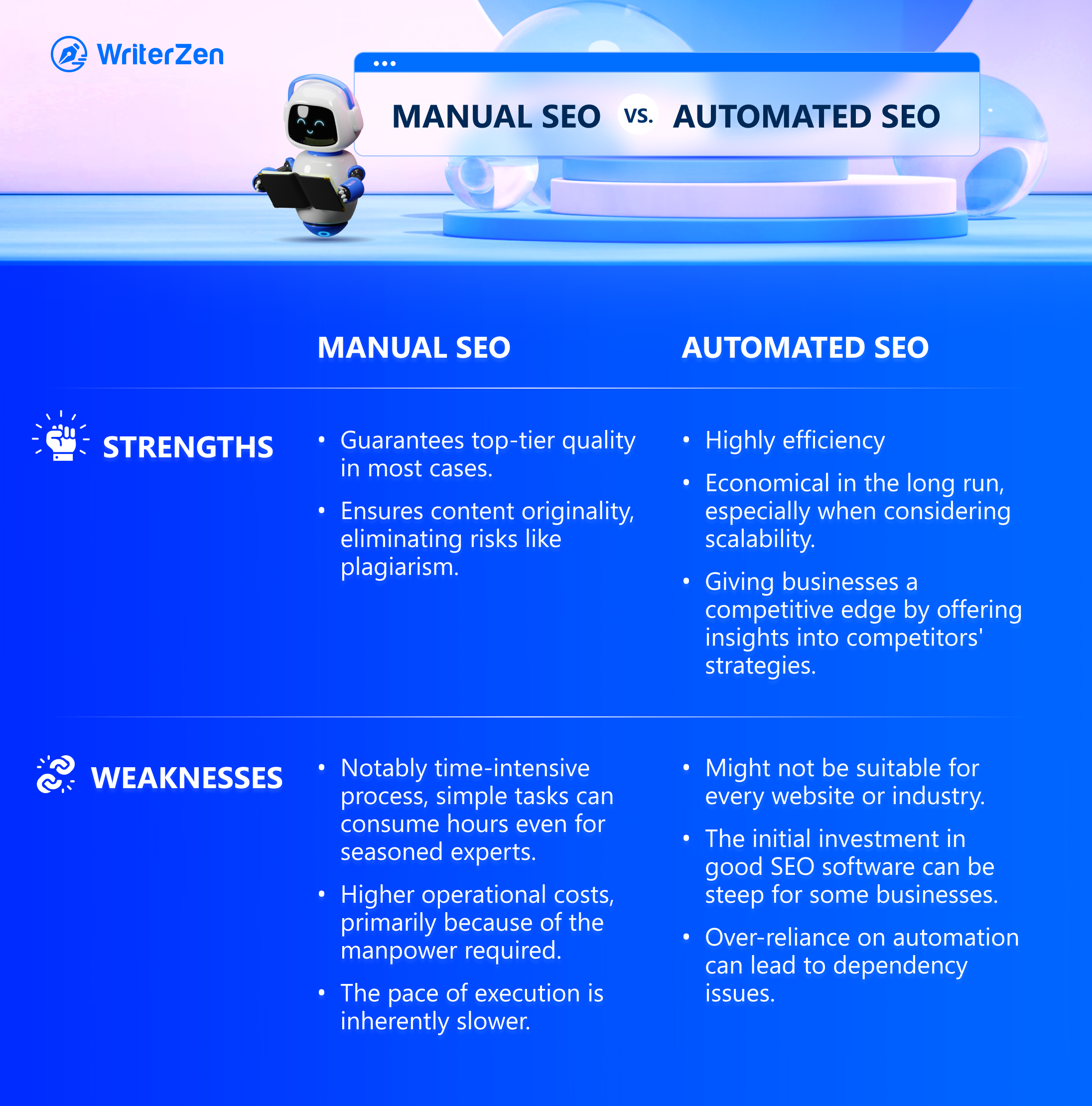
The Most Common SEO Repetitive Tasks
SEO, with its myriad tasks and constant need for monitoring, can be cumbersome. However, leveraging automation can significantly streamline these operations. Here's a dive into the most repetitive SEO tasks and the stakes of not automating them.
Topic Discovery and Keyword Research
Manually searching for relevant topics and keywords can be tedious. SEO practitioners have to regularly discover new topics and keywords following trends, algorithms, and consumer behavior change.
If you're manually keeping tabs on evolving trends and keywords, you may miss out on opportunities to align your content with what your audience is currently interested in. This can result in less traffic, lower engagement, and decreased competitiveness.
Content Creation
Creating content often involves similar steps, such as incorporating specific keywords, meeting word count goals, and maintaining a certain level of readability.
Crafting high-quality, keyword-rich content manually for every piece can be resource-intensive and prone to inconsistencies.
This can become a major reason for you to lag behind by publishing outdated content, placing suboptimal keywords, and even missing publishing deadlines, affecting both rankings and user experience.
Technical Optimization
Technical SEO can be a maze. Tasks like fixing broken links, optimizing images, and conducting speed tests are routine but essential.
Failing to consistently manage technical elements like site speed, mobile-friendliness, or broken links can severely impact user experience. Poor site performance can lead to lower rankings, increased bounce rates, and ultimately, loss of revenue.
Reporting and Analytics
Gathering and analyzing data is a continuous task. Marketers need to keep tabs on metrics like traffic, bounce rates, and conversion rates to gauge the performance of their SEO strategy.
Manual reporting is not just time-consuming but can also delay your reaction time to important data insights. Slower decision-making can mean lost opportunities, whether it's a timely adjustment to your content strategy or quick fixes to problems affecting your site's performance.
Rank Tracking
SEO involves consistently monitoring your website's rank for various keywords, which can change daily or even hourly.
Monitoring SERPs manually can't provide real-time updates, meaning you may not notice a drop in your ranking or a competitor's rise in time to make adjustments. This can result in reduced visibility, less traffic, and a weakened competitive position.
How Automated Workflow Can Improve Efficiency in SEO
Automated workflows in SEO aren't just about simplifying tasks; they're about redefining efficiency, harnessing data-driven insights, and gearing up for scalable growth. Embracing automation is like equipping your SEO strategy with a turbo engine, driving you faster and smarter towards your goals.
If you do SEO right, you'll get more visitors, more people buying or signing up, and meet all your goals. That's the way to get great results. Yet, when bogged down by manual procedures, your workflow suffers, leading to tardy results. Sounds convincing?
Here are 7 pointers to help you get a much better grip on the benefits of having an automated workflow in SEO:
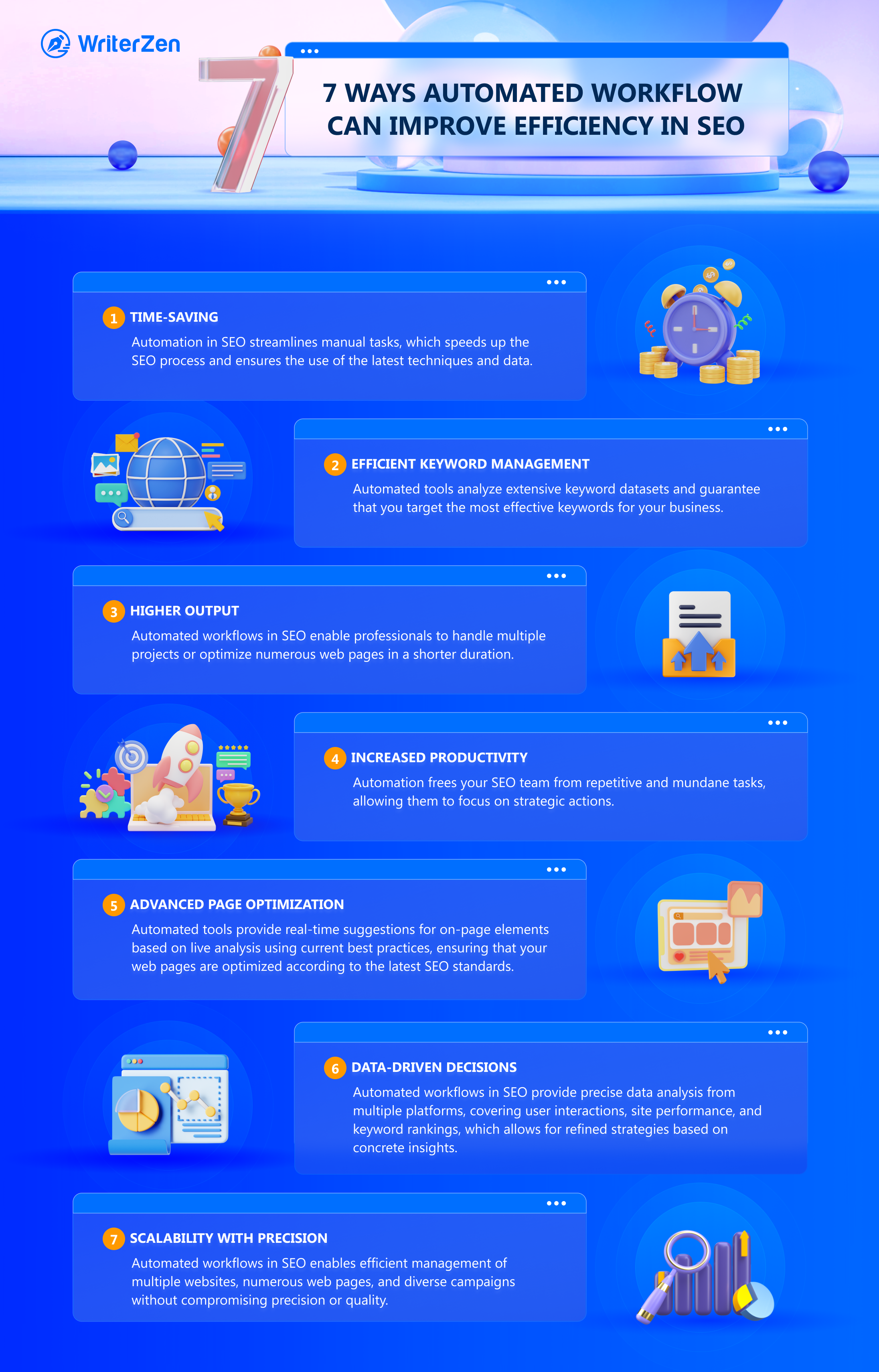
Time-saving
Integrating automation into your SEO process alleviates the need for manual tasks like keyword research, on-page optimization, and backlink monitoring. This not only expedites the SEO process but ensures that you're utilizing the most up-to-date techniques and data.
Efficient Keyword Management
Automated tools sift through vast keyword datasets to identify opportunities based on relevance, search volume, and competitiveness. This removes the exhaustive manual process and ensures that you're targeting the most effective keywords for your business.
Higher Output
With the reduction of time-consuming tasks, automated workflows allow SEO professionals to handle more projects or optimize more web pages in less time, driving faster results.
Increased Productivity
When automation takes over repetitive and mundane tasks, your SEO team can pivot its attention to strategic actions like planning long-term SEO strategies, competitor analysis, and innovation in the ever-evolving world of search engine optimization.
Advanced Page Optimization
Many automated tools offer real-time suggestions on on-page elements such as meta tags, content structure, and internal linking, based on live analysis against current best practices. This ensures that your web pages are optimized to the latest SEO standards.
Data-Driven Decisions
Automated workflows in SEO offer precise data analysis from various platforms, including user interactions, site performance, and keyword rankings. This wealth of information ensures that your strategies are refined based on concrete insights, not just hunches.
Scalability with Precision
As your website or business expands, so do the challenges in SEO. Automated workflows allow you to efficiently manage multiple websites, thousands of web pages, and various campaigns without diluting precision or quality. This means you can continue to grow.
Introducing Keyword Planner by WriterZen to Automate Your Workflow
With the Keyword Planner, we can automate several tasks such as clustering keywords, accessing data output, refining keyword lists, and setting up articles.
All the so-called repetitive tasks take just a few minutes. Amazing, right?
Every digital marketer worth their salt knows the importance of keyword data. But what if we told you there's a tool that goes beyond the usual?
Enter the Keyword Planner. Let's break down what makes it exceptional.
Keyword Clustering and Classification with Keyword Planner
To start, when you gaze upon the data from the Keyword Planner, two main views captivate your attention: the default “Clusters view” and the “All keywords view”.
Now, if you imagine the cluster view as a roadmap detailing every twist and turn of your keyword journey, you're not far off!
It offers a panoramic overview, capturing the intricate web of relationships between keywords. Think of it as the storyteller, unraveling the narrative behind every keyword.
Here is a possible examples to demonstrate the point:
Let's say we want to build content around the topic of "house renovation.”
The “Topic” and “Cluster” columns will become your guiding stars, helping you navigate and decode the groupings of keywords.
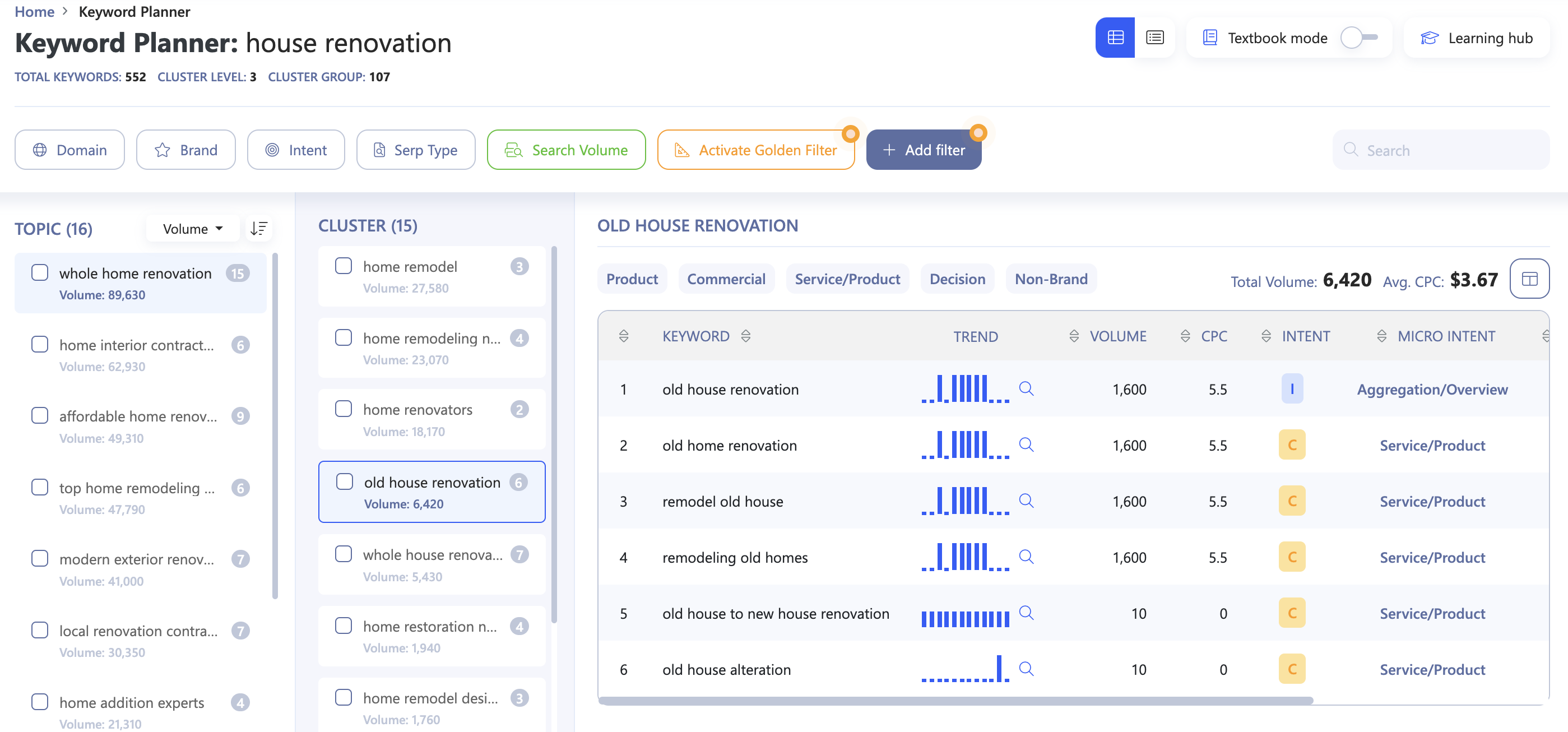
If you've used traditional keyword tools, you're likely familiar with metrics like search volume and cost per click.
Handy? Yes.
Comprehensive? Not quite.
They offer numbers without diving into the “why” behind keyword searches. That's where the Keyword Planner comes into its own.
Keyword Planner provides both quantitative and qualitative metrics, giving a holistic picture to make informed decisions. Besides basic keyword data, the tool provides insights on users’ intent behind the keywords and where to place the keywords in a buying journey.
You can click “Add filter” and select “Intent, Buying Journey, or Micro Intent” to filter out the keywords fitting your strategy.
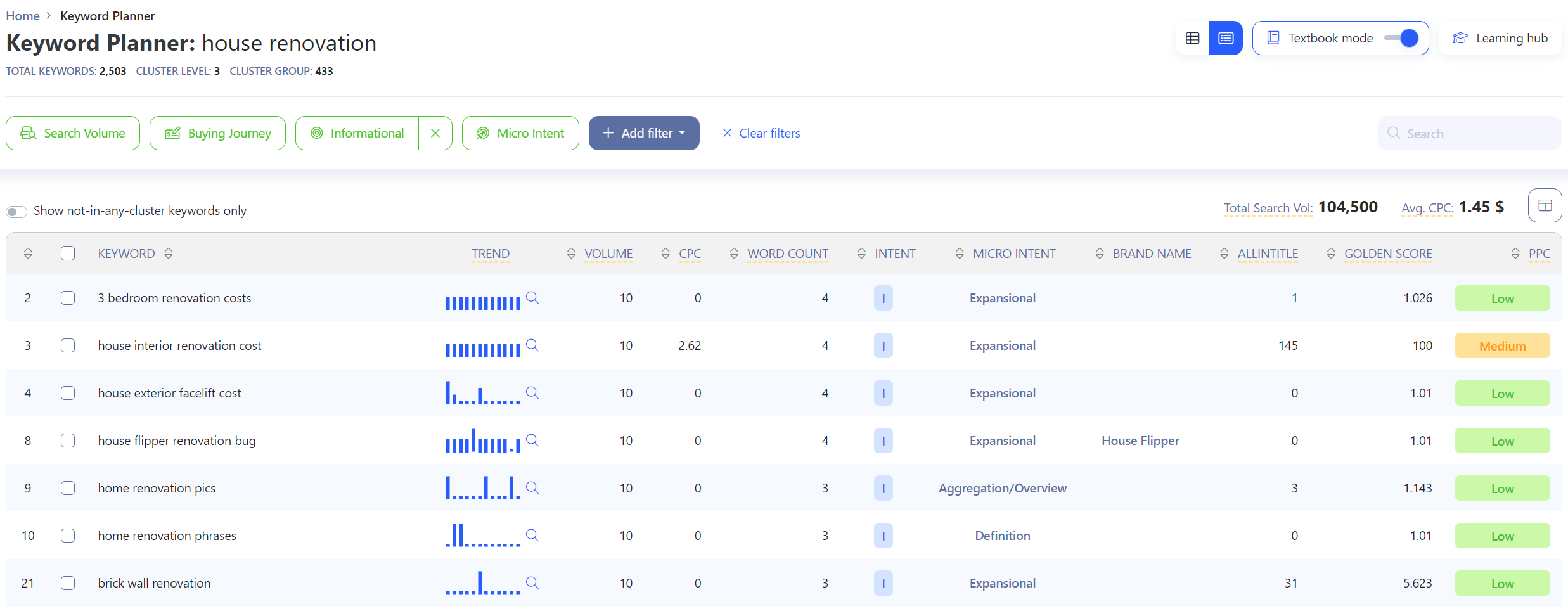
Armed with data on specific buyer journeys and macro and micro intent, you can channel your energy on those keywords sparkling with high search demand.
If you want to better comprehend how to utilize the Keyword Planner for quantitative data, we recommend you watch this video.
Moreover, Keyword Planner offers the "Domain Ranking Filter," allowing you to effortlessly filter your keyword data using domain-specific metrics such as Total Search Volume, Keyword Count, URL Count, and Weighted Average Ranking.
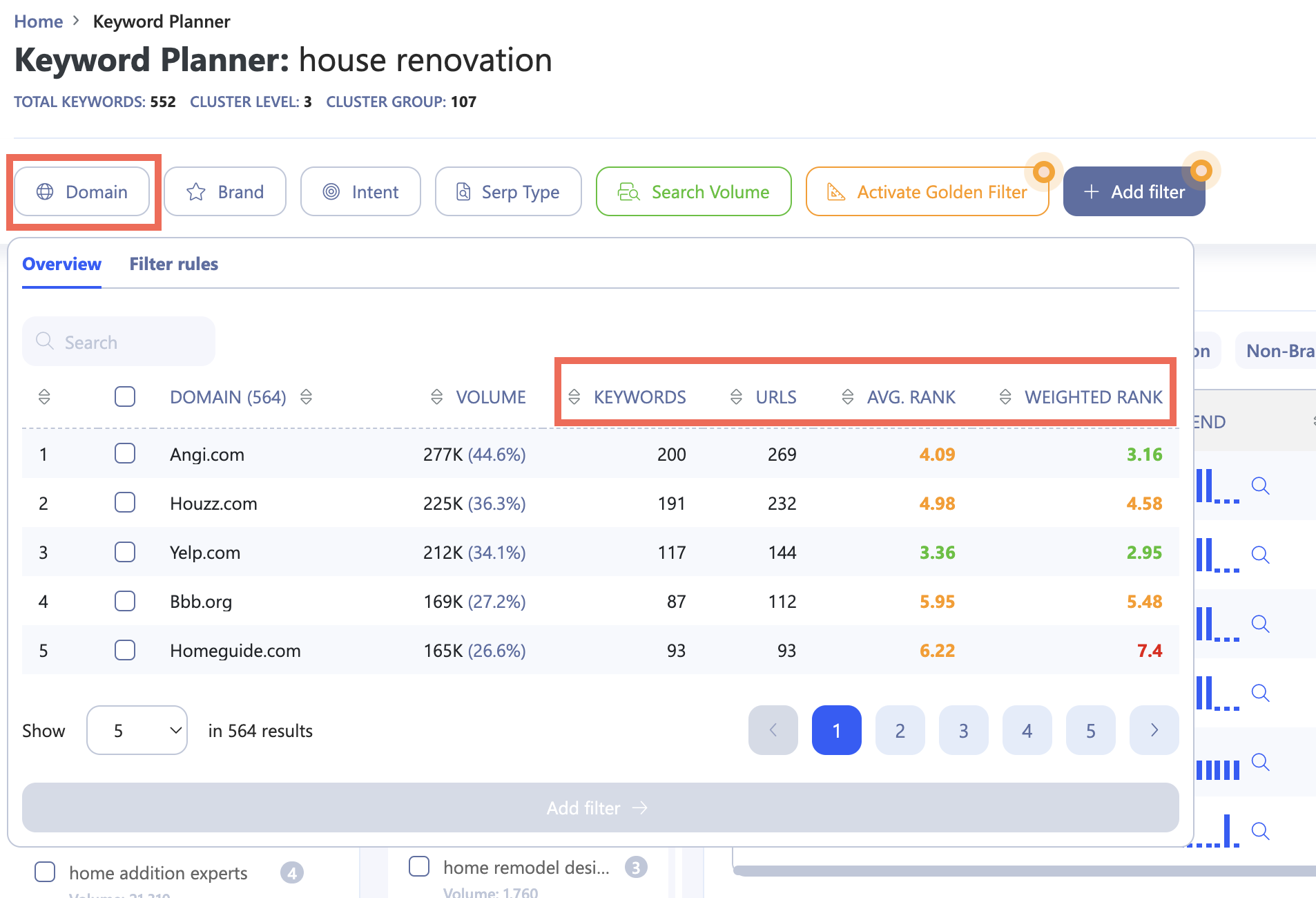
With Domain Filter, you can quickly identify what keywords a specific domain is ranking for and which ones it's not ranking for. This filter enables you to:
-
Health-check your own website and seek untapped ranking opportunities.
-
Identify keyword gaps and make informed choices to elevate your ranking by analyzing your competitors' domains.
-
Detect opportunities for quick rankings with social media websites.
For a comprehensive understanding of the Domain Filters’ functionalities, you can visit our in-depth lesson here.
Monitoring and Adjusting Your Content Strategy Based on Keyword Planner Insights
Every keyword has a story and intent behind it.
When users type in a search query, are they seeking information? Or perhaps looking to make a purchase?
Keyword Planner is adept at discerning this intent. It sheds light on the kind of content that's currently ranking for specific keywords, thus giving users a blueprint to craft your content.
For instance, let’s say you need to know if the keyword “weight loss meal planner” search primarily yields product pages or not.
Based on the data provided by Keyword Planner, it would be wise to lean towards producing product-centric content over mere informational articles.
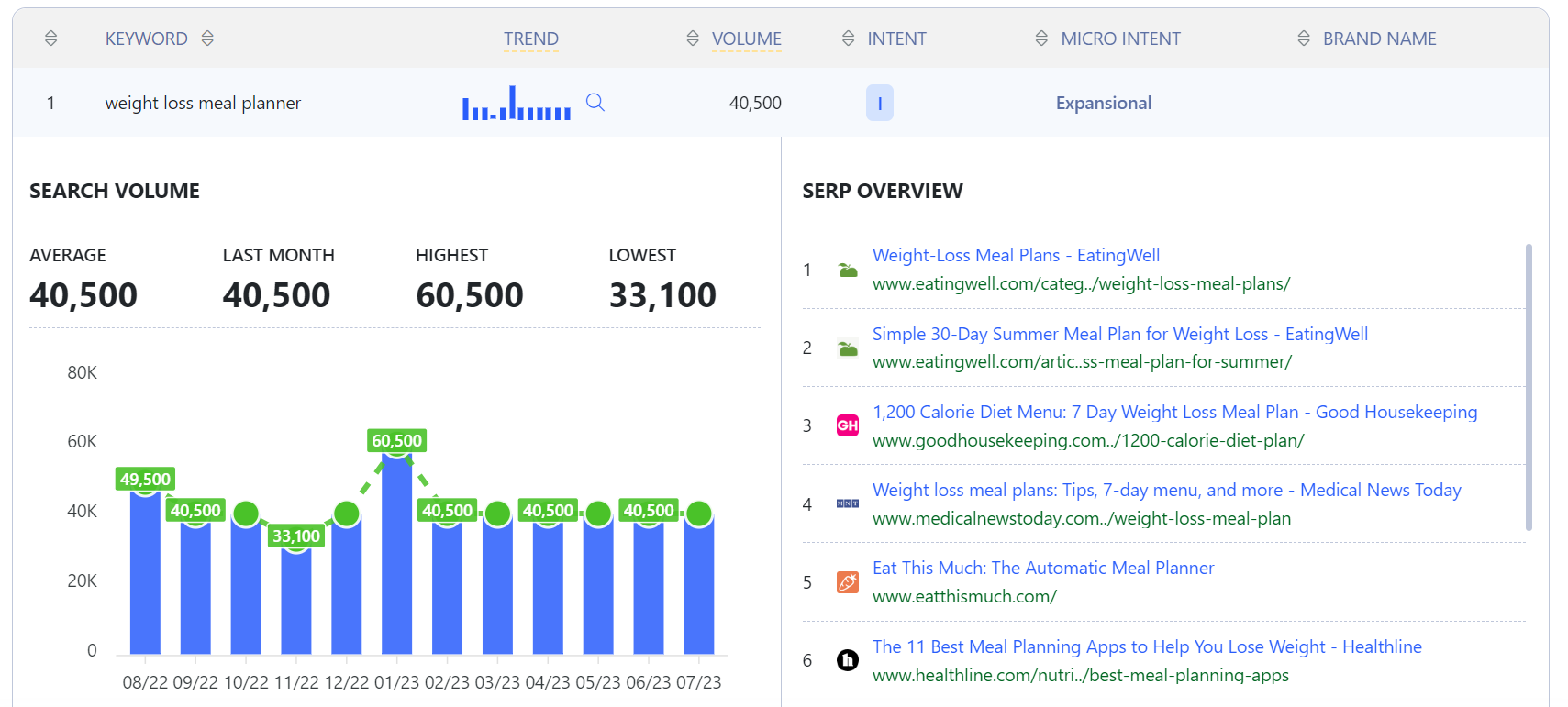
However, keyword intent isn't always black and white. It can be multifaceted, merging both informational and commercial dimensions.
The key lies in examining search results, discerning the predominant content type, and understanding the overarching market intent.
To further deepen this understanding, delve into micro-intent and the buyer's journey.
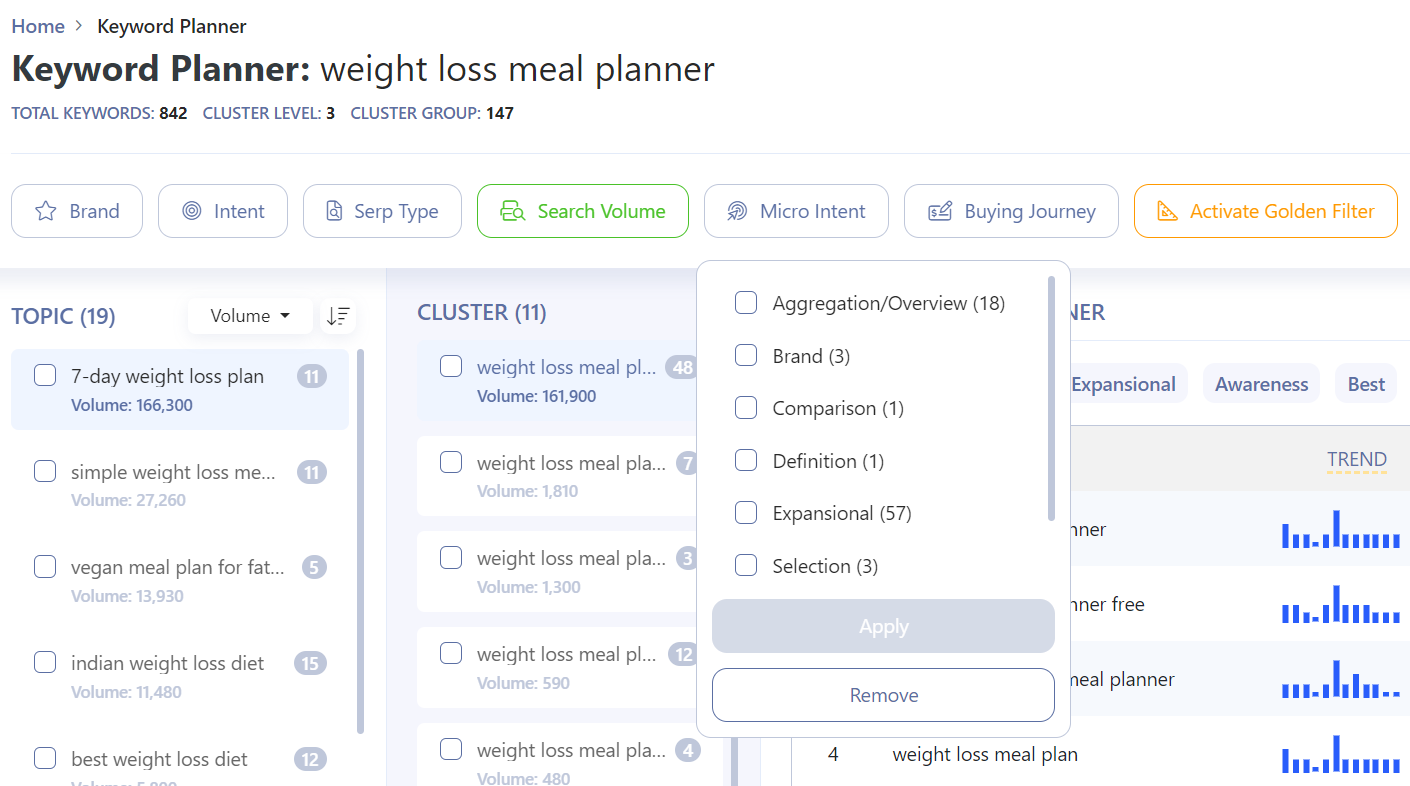
It not only uncovers insights for shaping content but also highlights the evolving phases of a potential customer's thought process.
But that's not all.
The consolidated dashboard acts as a pivotal console for making enlightened decisions about keyword targeting. It allows marketers to gauge the pulse at both macro (topic) and micro (keyword) levels.
This dual perspective ensures you aren't just chasing trends but understanding their origins and trajectories.
The Keyword Planner is instrumental here, empowering users to not just set a course but adjust it based on real-time data. Be it understanding search volume shifts, market trends, or the intricacies of the SERP landscape; the Planner has you covered.
All of this data can be used to create a strategy that is tailored to your needs and make adjustments as you go, ensuring that you are always staying on top of the latest trends.
With insights on keyword difficulty, volume trends, and SERP dynamics, marketers can sharpen their strategies, ensuring content doesn't just resonate but dominates.
Automated Content Generation with Content Brief
Imagine you're about to write an article but you're not sure where to start.
Our "Suggest Content Brief" button is your lifesaver. It gathers all the important keywords for your topic and hands you a blueprint. It's like a roadmap for your article, showing you all the important stops.
Let's say you pick the group called "weight loss meal planner."
Just click "Suggest Content Brief" for your desired topic or cluster and you'll get all the info you need to start writing. This includes what angle to take, who you're writing for, what type of content to make, and how it should sound.
Don't worry if you want the creative freedom to add different angles and make yourself stand apart from other articles. You can easily tweak it to fit your needs.
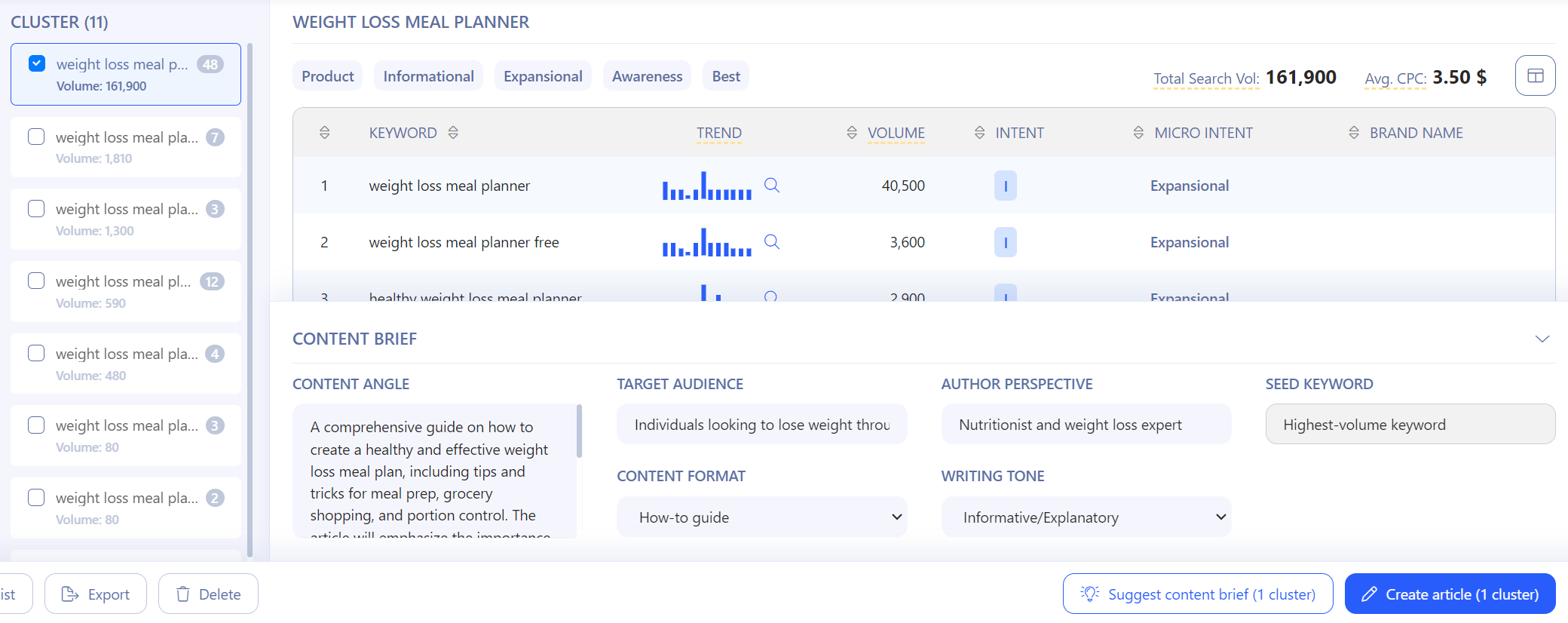
To start writing the article, just click "Create Article" You can set up the keywords, your project information, and choose if you want our AI Assistant to write the outline or whole article right away.
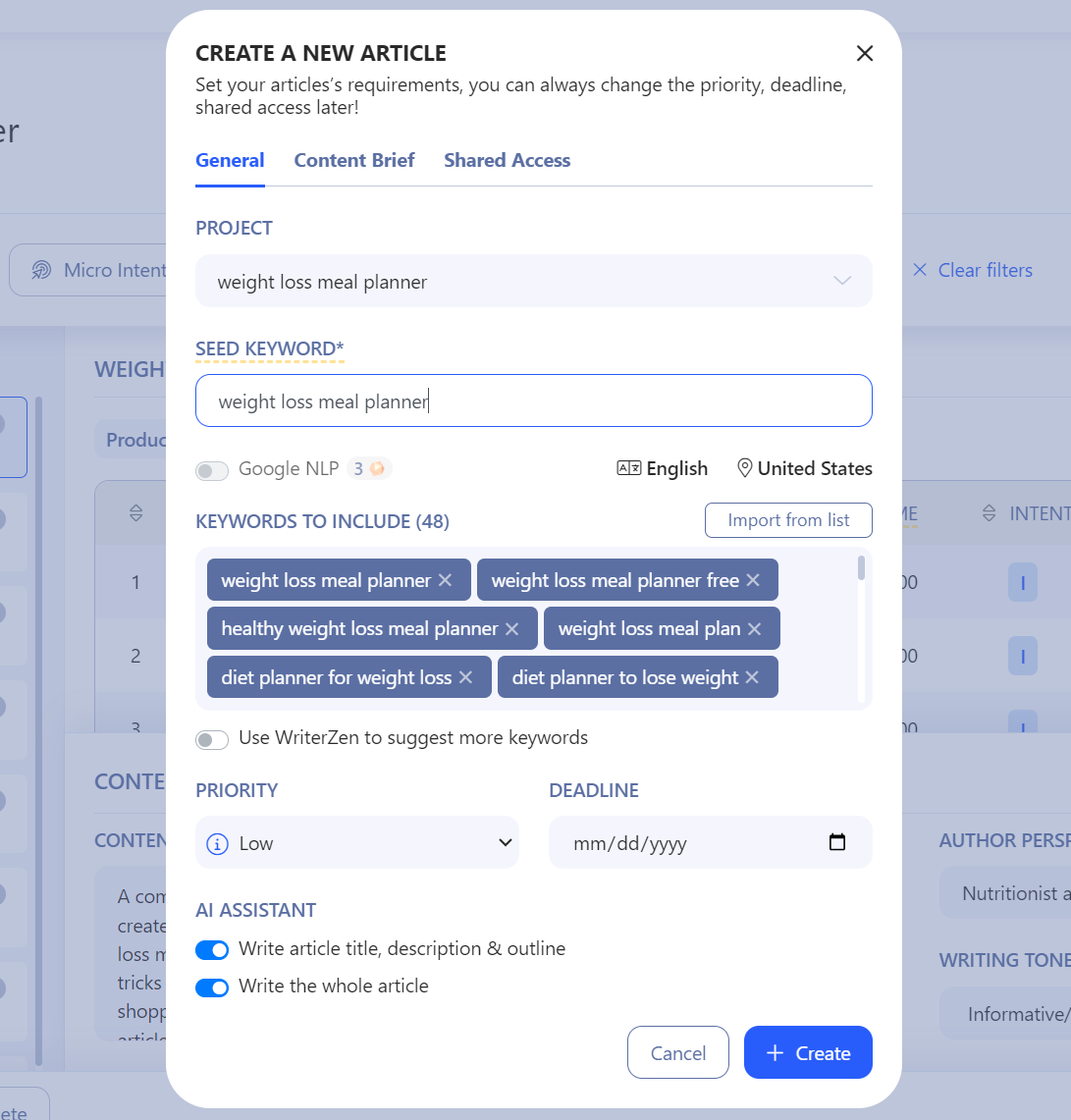
See how it gets easier? A full article that is free for you to edit and use in a snap.
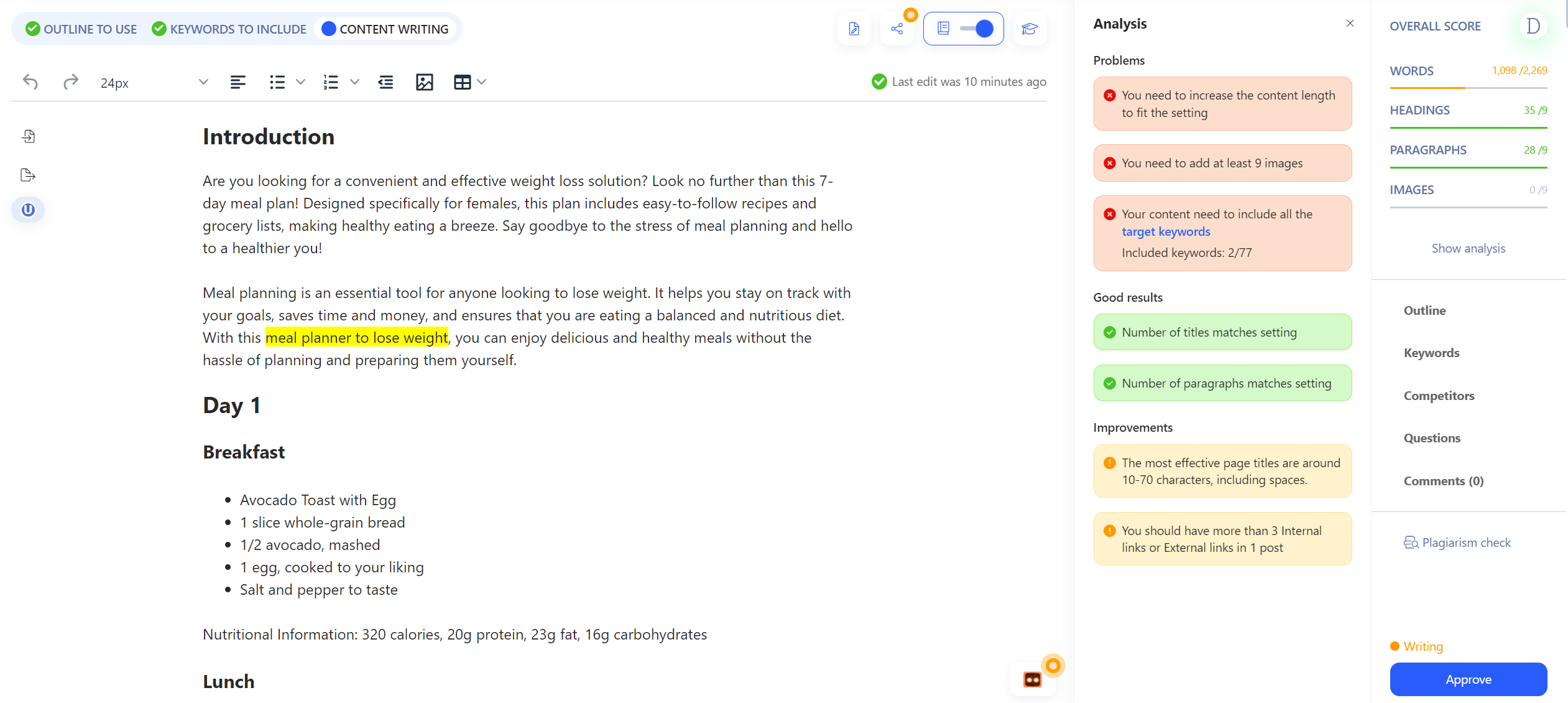
Maximize SEO Performance with Keyword Planner
Keyword Planner by WriterZen is a modern marketer's ally.
This tool doesn't merely automate keyword research; it adds layers of depth to the process.
From clustering and classifying keywords to discerning user intent and market trends, the Keyword Planner offers a panoramic overview of the keyword landscape. Click here for step-by-step instructions on making the most out of this incredible tool!
Its capabilities of monitoring real-time data for competitive keywords and suggest content briefs are instrumental in ensuring content not only resonates with audiences but also dominates the search engine results.
Ready to embark on the automated SEO process with efficiency and data-driven decision-making? Try integrating the Keyword Planner into your workflow today.





